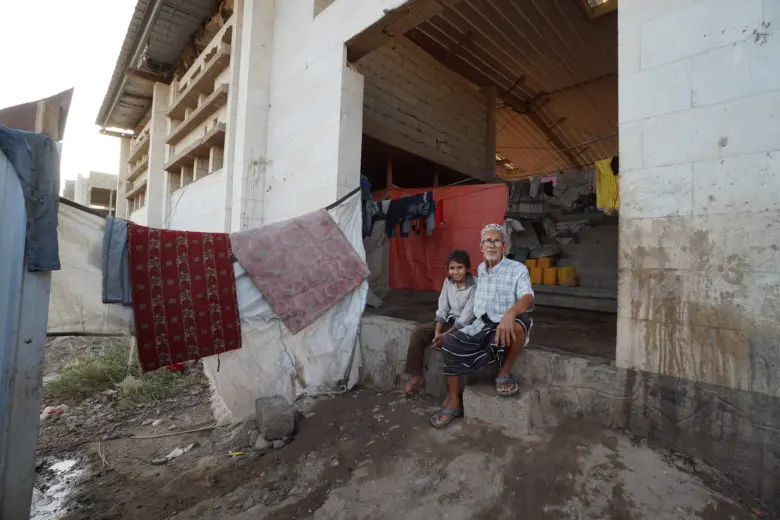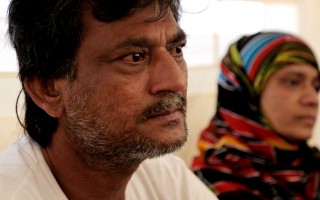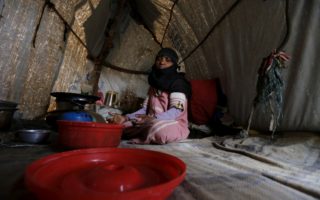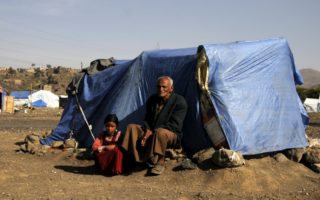
Seventy-five-year-old Ahmed Asslan Saghir was displaced from Al Hudaydah and is now living at Ammar bin Yasser camp in Aden with his 12-year-old son. © UNHCR/Mahmoud Fadel
By Jean-Nicolas Beuze, as told to Lauren La Rose
After completing his post as UNHCR Canada Representative, Jean-Nicolas Beuze assumed his new role this year as UNHCR’s Representative in Yemen, where more than 80 per cent of the population depend on humanitarian aid for their daily survival. After five years of conflict, he explains how COVID-19, severe weather and a funding shortfall have deepened the impact of the world’s worst humanitarian crisis.
Can you describe how the COVID-19 pandemic has affected refugees and internally displaced people in Yemen?
COVID-19 hit Yemen at one of its worst times for the country. With half of the health facilities destroyed by the war, most families having no resources to buy food or medicines and the recurrent cholera and malaria, the population is extremely vulnerable and cannot protect itself from the COVID-19. How can any of the 3.6 million Yemenis displaced by five years of conflict practice social distancing when they live in temporary shelters or under plastic sheeting tents provided by UNHCR? How can 80 per cent of Yemenis whom rely on external aid for their daily survival “stay home” when their daily wages barely ensure they can buy food for their kids? Many lack access to running water or soap to wash their hands regularly. In these circumstances, UNHCR assistance and protection of the most vulnerable become even more critical.
The country has been hard-hit by heavy rains and flash floods that have wreaked havoc. Can you describe the impact you’ve seen on the ground as a result of the extreme weather?
Over the last three months, seasonal torrential rains and flash flooding across Yemen and recently particularly on the Red Sea Coast and in Marib — one of the governorates with the highest number of families displaced by the conflict — have hit more than 300,000 Yemenis. The displaced families assisted by UNHCR have seen their temporary shelters and the few belongings they had saved from their homes previously destroyed by shelling or bombing washed away. Once again, they need to start from scratch. Our UNHCR kitchen sets, mattresses or shelter kits are a lifeline for these families.
What if any impact has the ongoing conflict in Yemen had in UNHCR’s ability to deliver humanitarian aid?
Despite repeated calls for ceasefire and an end to the conflict, the fighting, shelling and bombing continue unabated to kill, maim and displace families, and to destroy civilian infrastructures like schools and hospitals. Proportionally, more and more civilian women and children fall victims to the conflict. In less than a year, an additional 10 frontlines became active, and now civilians —but also humanitarian partners — are faced with increasing risks. Access to civilians to assess their needs and provide them with life-saving assistance is a daily challenge.
Ensuring that civilians have safe passage to places where they are and feel protected from the impact of the conflict and where we can assist them is a key aspect of UNHCR advocacy work in Yemen.
But despite all these challenges, every day, our UNHCR and humanitarian partners’ team are on the ground, protecting and helping populations to survive and be more resilient.
What kinds of resources and supplies are most needed right now on the ground?
With 50 percent of our funding requirements met, UNHCR has had to prioritize our response, targeting the most vulnerable only and for essential life-saving interventions. More sustainable and dignified solutions for shelters than the current focus on emergency shelter kits are critically needed to help families regain a sense of normalcy in their lives and help them restore their dignity. Increasing the number of beneficiaries of our cash assistance program would avoid so many displaced and refugee families have to resort to dangerous coping mechanisms, such as reducing their food intake or living in unsanitary conditions threatening their health and well-being.
Many people UNHCR assist have lost their low-paid daily unskilled jobs due to the slowing down of the economy because of COVID-19. Some refugees have been discriminated due to their status in accessing livelihoods opportunities or health services. UNHCR’s cash program has never been so important to ensure that most vulnerable displaced families survive during this pandemic. Protection services, such as psychosocial support for survivors of violence, including sexual violence, for children with difficulties coping with the overall situation, for persons with disabilities and older persons who are often neglected, had to be scaled down. What will be the long-lasting impact of not having been able to be by the side of these extremely vulnerable Yemenis and refugees during these critical times?
What can Canadians do to help support the work of UNHCR and the Yemeni population?
Yemen seems, at times, like a lost cause. So far away. So complex — with no end in sight.
But I also know that rarely in my 23 years of humanitarian work, I have seen that every loonie counts. And what we need now is additional financial support so that we can do more than half of what we know needs to be done.
Despite all the challenges linked to operating in a conflict and a COVID-19 environment, we know how to save lives and help internally displaced and refugees families build their own resilience. But we need to be given the means to do so. It is therefore critical that for those of you who can help further, you continue donating to UNHCR. It is equally important that you raise the profile of this forgotten crisis so that your government continues supporting our program in Yemen and elsewhere and champion the refugee cause.





